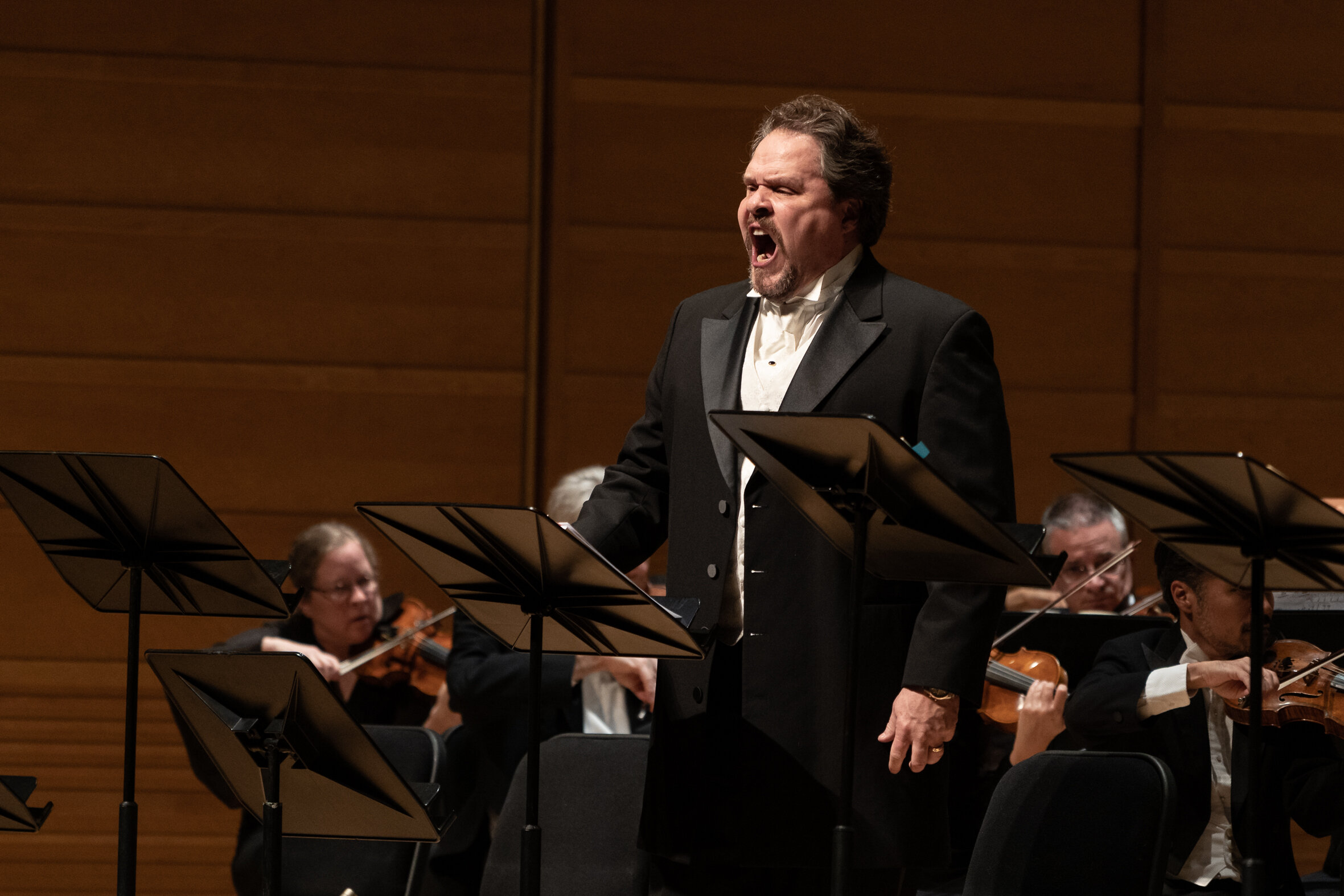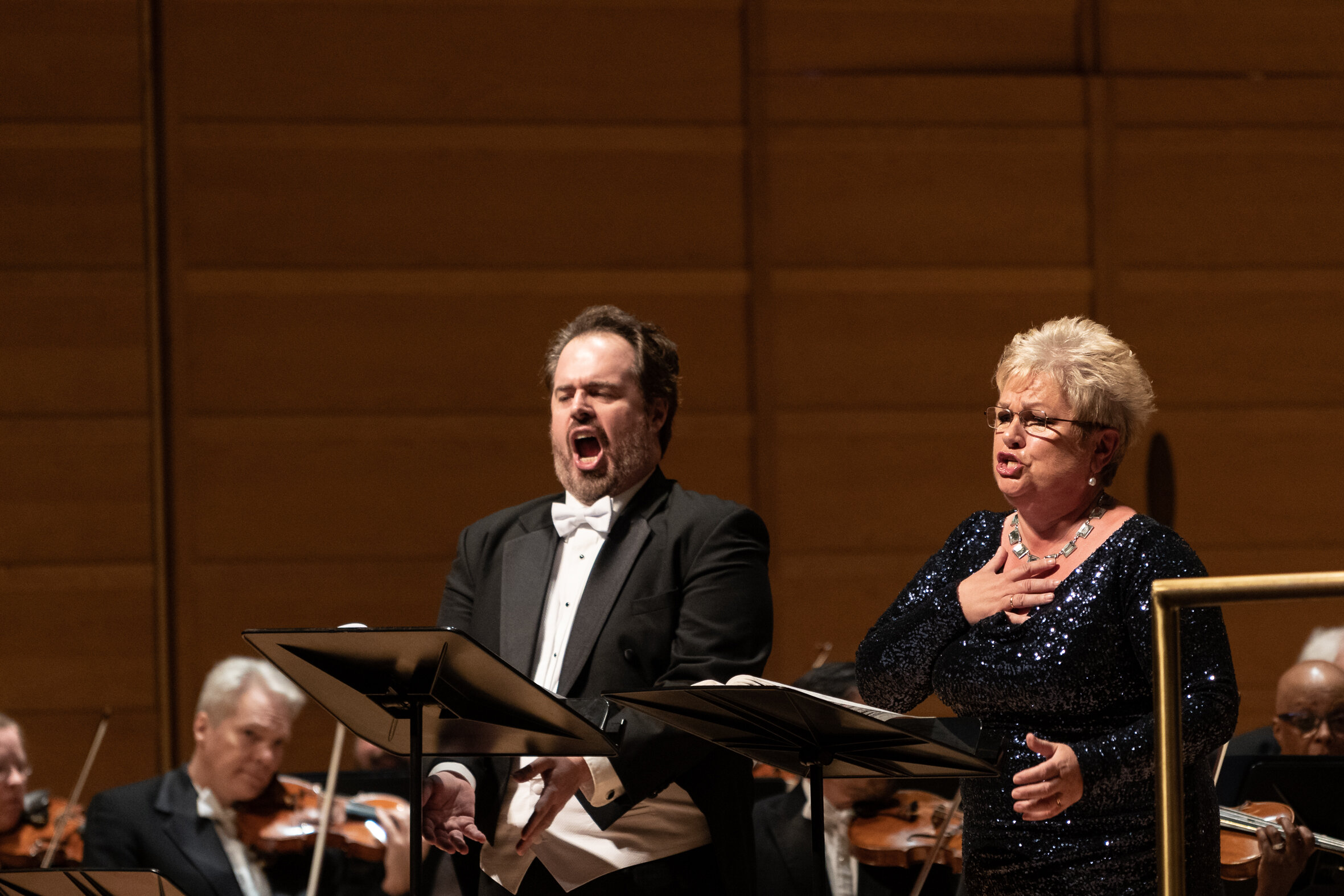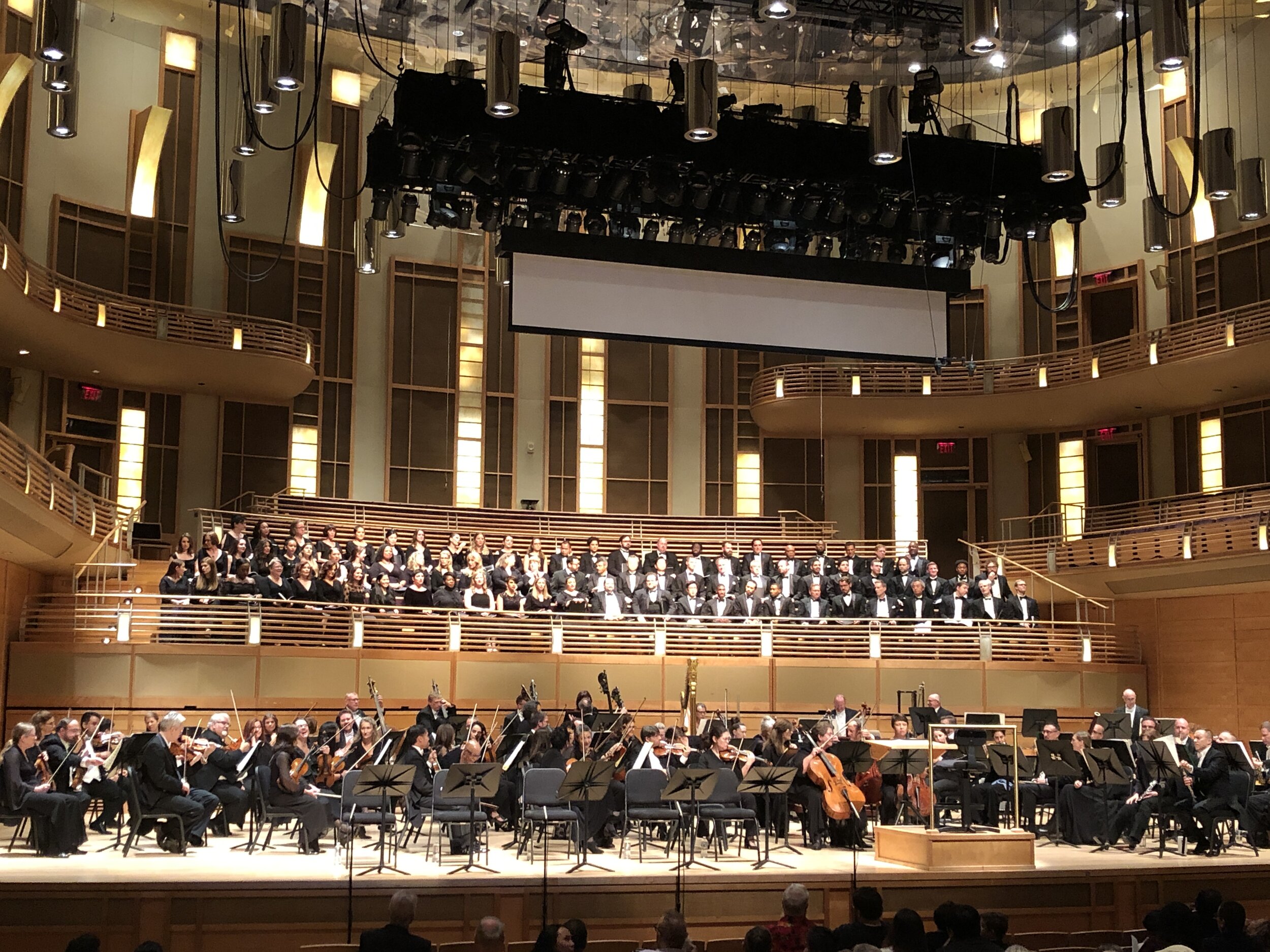Suburban Maryland now has a hometown opera company (I’m talking to you Bethesda, College Park, Kensington, Rockville, Silver Spring, and Wheaton). And folks, the hometown opera company can bring it!
Maryland Lyric Opera is known for training up young opera singers to start them on the road to regular employment and stardom, but the MDLO brain trust is an impressive contingent of veteran opera and classical musicians with connections to other performers who have been there and done that. They know quality and can attract it. On Saturday night, they called on an impressive array of veteran performers with a few of the youngsters thrown in. Not only did MDLO bring it, but they brought it in force. In addition to the singers, there was an 80-person chorus led by veteran Chorus Master Steven Gathman and an 80-piece orchestra with Concertmaster Jose Cueto, led by veteran Conductor Louis Salemno. Both talent and experience were on full display in the concert performance of Giacomo Puccini’s Il Tabarro (1918, librettist Giuseppe Adami) and Pietro Mascagni’s Cavalleria Rusticana (1890, librettists Giovanni Targioni-Tozzetti and Guido Menasci). In the few previous years of their existence, I might have referred to MDLO performances as undiscovered gems, but based on the crowd Saturday night, I’d say word is getting around.
Baritone Mark Delavan who played Michele in Il Tabarro and Alfio in Cavalleria Rusticana. Photo courtesy of Maryland Lyric Opera.
Il Tabarro is a portrait of a loving relationship gone bad all the way to a tragic ending when an emotionally-estranged barge captain on the river Seine realizes his wife is having an affair. Tabarro, like Cavalleria Rusticana, is a short, one-act opera that is often paired with another short opera to serve out an evening. In fact, it is part of Puccini’s trilogy of short works titled Il Trittico; the other two are Suor Angelica and Gianni Schicchi. Pietro Mascagni might appear to be a one-hit wonder and might not be even that, but for his wife. He wrote Cavalleria Rusticana for a one-act opera competition. He had doubts and was considering using another of his works, when his wife submitted it for him, and it won. CR is also about a love gone bad, and in fact, this opera led a shift to the verismo (realism) style of Italian opera that focused on the problems and often harsh conditions encountered by everyday people. Mascagni did have some smaller successes as a composer (L’Amico Fritz is still performed) and also led a very successful conducting career. Both Il Tabarro and Cavalleria Rusticana are masterworks and well worth giving a listen. My guess is that some of the music in CR will be familiar even if you haven’t attended the opera before. We are fortunate to have MDLO bring them to us in concert mode where the focus is on the music and the singing, and with a full orchestra and chorus, a rare opportunity.
Tenor Yi Li as Luigi and soprano Jill Gardner as Giorgetta in Il Tabarro. Photo courtesy of Maryland Lyric Opera.
I do have one small suggestion based on personal preference. Listening to Puccini’s Il Tabarro followed directly by listening to Cavalleria Rusticana is like listening to an Aerosmith album, then following it with one by Van Halen. I love them both, but not since I was in the under-thirty demographic would I listen to two hard rock albums back to back. Both Il Tabarro and Cavalleria Rusticana are about husbands who get angry, like really, really angry because their wives are cheating on them and apply the Italian solution to their rivals. It’s intense and the music is often driving and eruptive. And keep in mind the number of performers on the stage is approaching two hundred! Both of these musical experiences are powerful. This is not a criticism; it is a plea for mercy. Okay, I am over emphasizing this aspect a bit; there is variety in Il Tabarro’s music, a rather interesting variety, and Cavalleria Rusticana begins gently and has a lovely, tranquil intermezzo before Alfio’s denouement. With a three-hour opera, the moods are dictated, but when you have a choice, why not take more advantage of that terrific orchestra: say, warm me up with a mixed program of opera/musical pieces, starting with Smetana’s Moldau, then hit me with either Il Tabarro or Cavalleria Rusticana, bring me down easy with Barber’s Adagio for Strings or something similar, and then leave me happy with the Marriage of Figaro overture. Let me believe it was all a dream and nobody got killed. Even Puccini ended Il Trittico with a comedy. For two years in a row now, the MDLO Orchestra has shown it can dazzle us with extraordinary playing and a rich, powerful sound. Now it is time to romance us a little.
Tenor Jonathan Burton as Tirrudu and soprano Susan Bullock as Santuzza in Cavalleria Rusticana. Photo courtesy of Maryland Lyric Opera.
Okay, the music was great; what about the singers? For me personally, it is mainly the sopranos that keep me going back to the opera house, but Saturday night, I have to admit that it was the guys whose stars shown the brightest. In Il Tabarro, baritone Mark Delavan delivered an authentic portrayal of the Parisian boat captain Michele, who off’s his wife’s lover, Luigi, in a macabre finish worthy of Alfred Hitchcock. Powerful in both voice and appearance, he was on point communicating both his pain and anger, sufficient to cause me to feel a moment of sympathy for him, all the while projecting the threat of a shark circling in the water. He even showed a magnanimous side, giving up his coat to cover Luigi’s corpse at the end (actually to briefly hide it, but we quibble). Importantly, he was able to ride the crest of the music from the full orchestra that occasionally slightly submerged some of the other singers. Kudos to Mr. Delavan on a bravura performance. Not far behind was soprano Jill Gardner’s performance as his wife Giorgetta. I love the timbre of Ms. Gardner’s soprano, and she sings with great beauty and emotion. Young tenor and MDLO graduate Yi Li served capably as Luigi. Another stand out was young mezzo-soprano Allegra de Vita, who sang the role of La Frugola, wife of stevedore Talpa, with a lovely, clear voice. She also sang the role of Mama Lucia in Cavalleria Rusticana; with hair up and wearing a more matronly dress, she projected an entirely different attitude. In two polished and quite different performances, she showed she has mastered her recent training and is on her way to stardom (don’t miss her in MDLO’s Thaïs later this season).
Bass-baritone Jake Gardner as Talpa and mezzo-soprano Allegra De Vita as La Frugola in Il Tabarro (she also played Mama Lucia in Cavalleria Rusticana). Photo courtesy of Maryland Lyric Opera.
A supporting cast filled out and enhanced the performance of Il Tabarro, including veteran base-baritone Jake Gardner as Talpa, recent MDLO trainees, tenor Joseph Michael Brent as Tinca and tenor Mauricio Miranda as song seller/young lover, and Madeleine Gray and Luciana Cecille as Una Donna. There was a bit of staging proffered in addition to the placement of Michele’s coat. The song seller was in the chorus balcony along with seven Mindinettes (members of the female chorus); impressively, the harp was also there for Il Tabarro. There was also an off-stage chorus of stevedores contributing. Lost of course, in a concert version, is some of the charm and story enhancement of these side characters, and use of different character placements adds welcome variety. The full chorus did not appear on stage until Cavalleria Rusticana. To add drama and irony, the action takes place outside a church during Easter Sunday Mass, a setting that gave Mascagni an opportunity to work in some beautiful choral numbers.
In CR, soprano Susan Bullock played the role of Santuzza, jilted lover of Turiddu. Ms. Bullock, a very popular headliner in Great Britain, has a beautiful voice that can soar, but her voice really excels in the gentler, highly expressive passages. On occasion, I had to concentrate to get its full measure against MDLO orchestra’s powerful backdrop. Jonathan Burton stepped up with a strong, bright, clear tenor voice, bringing Turiddu fully to life, another bravura performance that was a delight. Mr. Delavan again delivered an excellent performance in the role of the outraged husband, Alfio. Newcomer soprano Joowon Chae brought a fresh, colorful voice to the role of Lola, who despite being married, had jealously drawn Turiddu away from Santuzza. The youngsters were all good, but on that night, it was the veterans that showed us what opera can be.
A few years ago, I went to an opera concert while visiting Vienna, Austria. It was held in a palace but had the feel of a hometown performance. The singers were in the employ of the company and appeared often there. It seemed to me that for that audience this was a regular thing, for entertainment, go to the opera, particularly that opera company. It was a marvelous experience. I wondered why more companies didn’t use repeat performers. It’s fun to see favorites perform in different roles. Many of the singers on Saturday night were in last year’s MDLO concert performance of La Fanciulla del West, including Bullock, Burton, Delavan, and Gardner. Additionally, I have seen Ms. Gardner in two performances with Virginia Opera. It was also a pleasure to see Allegra De Vita again; she is a recent member of the Domingo Cafritz Young Artists at the Kennedy Center and has performed in several Washington National Opera productions. Most of the young singers have performed in previous MDLO concerts. So, the evening’s experience felt familiar and that felt good to me, a hometown feel.
I have found Maryland Lyric Opera to consistently deliver quality arts experiences with high entertainment value, using either veteran singers or their recent trainees. And if you want to make them your hometown opera, what’s wrong with that?
The Fan Experience: The Music Center at Strathmore is a great place to attend concerts -a beautiful, modern concert hall, free parking in the evenings and relatively easy in/easy out. For fully staged operas, MDLO uses the Kay Theatre on the campus of the University of Maryland, College Park.
Shot of the stage during intermission showing the orchestra and chorus. Photo by author’s spouse, Deb Rogers (fiammatravels.com).
MDLO presented the same program again on Sunday afternoon, but had the lead performers change roles, e.g., Ms. Bullock played Giorgetta and Ms. Gardner played Santuzza. This appears to be a breakout season for Maryland Lyric Opera, with expanded offerings for 2019-2020, including concerts by the MDLO Orchestra; one is with famed pianist Leon Fleisher. Their next performance will be the MDLO Young Artist Institute in Concert on November 1.





